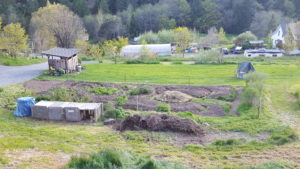Ode to the Weeds
-By Brandon Moncrief
At some point in most people’s experience, weeds present themselves. It doesn’t have to be the traditional relationship of putting tons of controls and poisons down to maintain the prized lush green carpet lawn. I once went on a plant walk with David Bruce Leonard, a well known weed enthusiast, in Hawaii and there wasn’t a crack in the ground that he didn’t see a plant that was medicinal or useful in some way. Many people would only think of weeds as being invasive. Invasive is a term that we like to use to categorize a plant that is particularly rampant and willing to fill a niche way too well. Are weeds really a nuisance that we must toil and struggle against for all of time?
Anyone who has tried to have a little veggie garden knows the predicament. You prepare the soil, plant the seeds, water and then suddenly the race is on! You have opened up a can of worms. The plants that you want to grow have to compete with what you want to see thrive. As humans we need that food plant to grow for our nourishment and the weeds just are not going to supply enough for us to sustain ourselves. So, the dilemma begins. Are we going to fight the weeds? Are we going to do just enough to allow our desired plants to survive and let the weeds have some space? Maybe the weeds are trying to help us become better gardeners.

I have heard it said before that a weed is any plant growing where you don’t want it to. Sometimes I think this mentality makes sense, but most of the time it comes across as harsh. Many books talk about the medicinal properties of dandelions, for example. The dandelion is probably the most famous weed of them all. Dandelions in your lawn could mean that your soil is on the acidic side or maybe that it’s a bit compacted. I like to think that the dandelion is fulfilling the apparent opportunity to be the best it can be. If the conditions are right for it to do well, then it will. If we alter the conditions, then it may decide that it is not the right time to sprout up out of the soil.
Another way to look at the situation is to peer inside ourselves and notice what needs to be cultivated. When working with row crops a scuffle hoe can be used to cultivate the soil, or clip the weeds that are trying to grow. In the same way humans can look at the aspects of themselves that are less desired. Tending your inner garden in a sense allows you to focus on what you know you want in life. I have done a lot of weeding in my life. Over the past few years I have tried to work with the weeds more. I try to see what purpose do they actually serve? The aspects of myself that I don’t want to prosper are not stamped out and seen as evil. I am trying to establish the conditions in my life so that the better parts of myself can sprout toward the sunlight. The weeds then become a part of the process, a way to reflect on what is currently happening.
No matter your relationship to weeds, it seems that they will always be a part of the ecological blueprint. The succession of our natural world needs them to do their part. The harder part for us it to uncover more of the story and try and see how it is all connected. Maybe in this way we can see more about ourselves while doing so.

